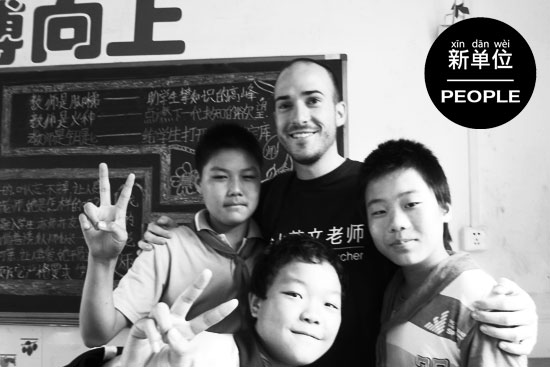[lang_en]October Featured People: Joshua Lange
Interview & Translation / yy Qian and Steffi Chen
1. Welcome to Xindanwei.com, Please introduce yourself. Could you tell us where you’re from and how you got started in the field?
I grew up in the U.S. state of Missouri. Prior to moving to Shanghai in 2010, I had been living in Hong Kong since 2008. That year, I was invited to join a group from a church in the United States who had funded a CWEF clean water system for a small village in Yunnan. I joined a team of people who helped to install the water system and meet the local people who would be benefited by the project. Since this first exposure to development work, I have been interested in getting involved on a more personal level. When the opportunity to work with CWEF in Shanghai arose, I jumped at the chance.
2. Can you tell me about CWEF, the non-profit you are the working for and what you do for them?
CWEF (Concordia Welfare & Education Foundation) is a Hong Kong based non-profit that works to improve the lives of the rural poor in China and Cambodia. We focus on two major issues that can help people pull themselves out of poverty: increasing educational opportunities and improving health conditions. To that end, CWEF provides scholarships and leadership training, funds libraries and teaching materials for local schools, builds clean water and biogas clean energy systems for rural villages, and conducts health and hygiene training.
In Shanghai, we are in the process of opening a representative office and have begun work to support the city’s migrant community, who have come to Shanghai from more rural communities all over China. CWEF is now working with two migrant schools in Shanghai to support education for these students whose families face a lot of challenges in their quest for a better life here in the city. In addition to supporting school fees for a number of students, CWEF is also partnering with the international community in Shanghai to provide supplemental educational activities at the schools.
3.What prompted the idea for your project and what excited you to make you undertake it?
CWEF’s work has been historically focused exclusively on reaching out to people living in poverty in the Chinese and Cambodian countryside. The expansion to Shanghai is a considerable step outside of our traditional ‘comfort zone.’
However, we know that China is changing: 2010 was the first year in history that more people live in China’s cities than live in the countryside. This is the result of the unprecedented migration of 250 million people from rural areas. Demographers do not expect this trend to slow down anytime soon; 500 million additional people are expected to migrate in the next three decades. As these migrant families arrive in the big city, though, they encounter many struggles, from finding stable work to providing quality health care and education for their children.
4.How do you define success as a development organization?
At CWEF, we have five principles which guide our project planning and are our measure of success: Sincerity in Action, Bridge Building, Commitment to Local Needs, Sustainable Impact, and Transformation. If we can accomplish all of these with our projects and continue to grow as an organization both in quality and in the quantity of people we touch through our work, I will be a happy man.
5.What are your future steps?
We are in the process of developing a leadership and life skills training program for middle school students in Shanghai. CWEF has been running a similar program for our high school scholarship recipients in Yunnan and Guangdong, which has been very successful and which we are planning to expand to more schools and more students in the future. I’m really excited about this project because it not only puts kids through school, it helps them develop a broader view of their education and think more critically about the world they live in. This project is also designed so that the local teachers are trained as adult advisors who essentially run the program themselves. This kind of ‘training of trainers’ program is more sustainable and helps further develop the local teachers as well.
6.Thanks again for providing Xindanwei.com this opportunity to interview you. Any final thoughts for our readers?
CWEF reaches out not only to the marginalized people of Asia; we also seek to provide ‘servant learning’ opportunities for those who have been blessed with considerably more. We are always looking for more opportunities to partner with schools, businesses, and other organizations who want to become directly involved in our projects.
If you’re interested in learning more, feel free to send me an email at shanghaiservice@cwef.org.hk. If you’re interested in supporting our education and health projects in China and Cambodia, head over to www.cwef.org.hk/give. 感谢!
shanghaiservice@cwef.org.hk[/lang_en]
[lang_cn]人物(十月):Joshua Lange
采访和翻译/yy Qian和Steffi Chen
问:欢迎来到xindanwei.com,请先介绍一下您自己。告诉我们您是从哪儿来,又是如何开始从事您所在的领域的呢?
答:我在美国的密苏里州长大。我2008到2010年住在香港,之后在2010年来到上海。在香港的时侯我是受到一个来自美国教堂,在云南建立了CWEF清洁水系统的团体邀请。我加入了帮助建立水系统,并与受益的当地群众交流的一群人。从最初接触这项发展工作之后,我开始对从更个人层面上参与这件事产生了兴趣。当为上海CWEF工作的机会来临时,我好不犹豫地加入了。
问:能多介绍一点CWEF,你现在工作的这个非营利性组织吗?你为他们做些什么呢?
答:CWEF (协同福利及教育基金) 是香港的非营利性组织,致力于推广中国和柬埔寨的贫困人民生活质量。我们专注于两件能够帮助人们脱离贫困的事情上:增加教育机会和改善健康条件。CWEF提供奖学金和领导能力培训,为当地学校筹建图书馆和提供教学材料,为农村建造清洁水和生物清洁能源系统,和组织健康卫生培训。
在上海,我们们正在建立一个代表处,并开始做一个支持从农村来到上海的外来人口群体的工作。CWEF目前在于两所打工子弟学校合作,为这些艰难地在大城市中追求更好生活的家庭的孩子提供更好的教育。除了帮一些学生分担学费以外,CWEF同时与在上海的外国人一起为这些学生提供额外的教学活动。
问:是什么让你的项目得到发展,又是什么激励你来参与这个项目?
答:从历史上来讲CWEF的工作之针对中国和柬埔寨的乡村地区。扩张到上海是对迈出我们传统“舒适区域”相当大的一步。
不过,我们知道中国在发生着改变:2010年是中国史上第一次城市人口超过农村人口。这是2.5亿人空前巨大规模地向城市移民的结果。人口学家认为在近期这种移民的脚步都不会放缓。在未来30年内,更有5亿的人口还将继续向城市移居。当这些移民家庭来到城市中,面临的是许多困难,从寻找稳定的工作到获得可靠的医疗到子女教育。
上海的外来人口有很多的需求,但我们发现在人群中稍幸运一些的人有惊人的兴趣来帮助身边的人。看到这种现象我们非常受鼓舞,我期待看到未来会发生什么。
问:你如何看待作为一个发展中的组织的成功?
答:在CWEF,我们有五条原则来指导我们规划项目和考量成绩:真诚的行动,建立桥梁,对当地需要的承诺,可持续的影响,和转变。如果我们的项目能达到以上这五点,并且我们的组织能在质量上和影响到的人的数量上都有所成长,我就很开心了。
问:你们有哪些未来发展计划?
答:我们现在正在策划一些针对上海中学生领导能力和生活能力训练的课程。CWEF曾经在云南和广东我们的高中奖学金获得者中开展过类似的项目。项目获得了巨大的成功,我们打算把它推广到更多的学校和学生中去。我非常期待这个项目,因为它不仅让学生走进课堂,更让他们用更宽广的眼界来看待他们的教育,对周围的世界有更辩证的思考能力。这个项目同时训练当地的老师成为学生的顾问,能够自己来开展这样的教育。这种“教育者的训练”更加有可持续性,能够帮助当地教师们的发展。
问:再次感谢您给xindanwei.com这个采访您的机会。您还有什么相对读者说的吗?
答:CWEF不仅仅关注被边缘化的人群,我们同时希望能提供“服务意识的学习”给到社会中更幸运的一些人。我们一直寻找机会与愿意参与进来的学校、企业和其他组织合作。 如果你感兴趣并想要了解更多的话,可以给我发邮件shanghaiservice@cwef.org.hk。 如果你有兴趣支持我们在中国和缅甸的教育和健康项目,访问www.cwef.org.hk/give。感谢!
联系Joshua Lange:
shanghaiservice@cwef.org.hk[/lang_cn]

